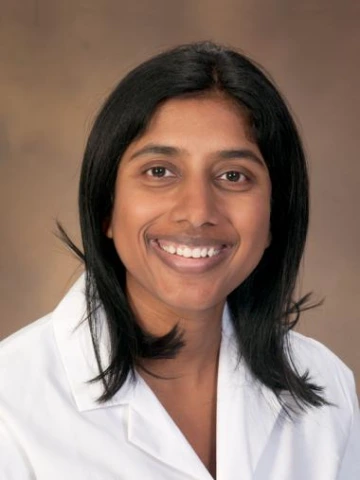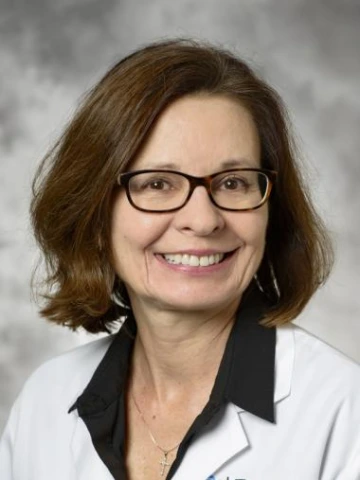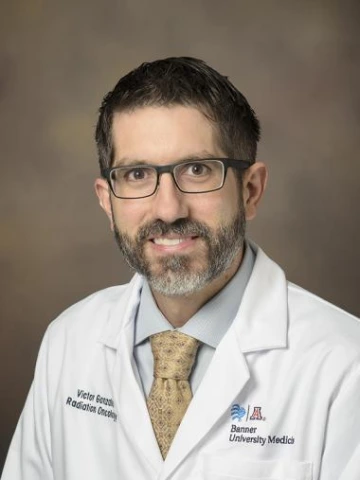Patient Profile: Amber Kneen

Amber Kneen, 36, an army veteran, wife and mother of two was stationed overseas when her life took an unexpected turn. She was diagnosed with inflammatory breast cancer (IBC), a very rare, rapidly-growing and highly-aggressive form of breast cancer.
At the time of her diagnosis, Amber, her husband and two children were living in South Korea. She began initial treatment there but had reservations about remaining in South Korea long-term with her cancer diagnosis and the treatment options.
“I was terrified the more I learned about the disease following my diagnosis,” Amber said. “The care I received in South Korea was excellent, but I was concerned with the language barrier.”
Amber decided to move back to the United States to be closer to family. She investigated options, which included being transferred to the Dana-Farber Cancer Institute in Boston or beginning treatment in Tucson, where her family lives. In fact, Amber’s father had recovered from cancer and was treated by clinicians at the University of Arizona Cancer Center, which is clinically affiliated with Banner – University Medicine and its two hospitals in Tucson, Banner – University Medical Center Tucson and Banner – UMC South.
“He urged me to investigate receiving care where he received care,” Amber said.
201106214_ Chalasani, Pavani.jpg

Pavani Chalasani, MD
Shawn Mulligan, an oncology nurse navigator at Banner – UMC Tucson and affiliated team member of the UArizona Cancer Center, was the first to speak with Amber by phone while she was in South Korea. Amber then received a call from Pavani Chalasani, MD, a breast cancer expert, research member in the Therapeutic Development Program, and chair of the Scientific Review Committee at the UArizona Cancer Center, to detail the treatment plan and the quality of care she would receive.
“Those conversations really put me at ease,” Amber said. “They explained that the UArizona Cancer Center was a National Cancer Institute-designated Comprehensive Cancer Center, recognized for its scientific leadership, research and resources. Based on everything they told us, we were convinced to move to Tucson.”

Nova Foster, MD
To prevent delays in care, she received two cycles of chemotherapy in South Korea before flying the approximately 6,000 miles to meet her treatment team who were waiting for her in Tucson. Dr. Chalasani immediately involved the Breast Multidisciplinary Team, and Amber was seen by Nova Foster, MD, a surgical breast oncologist at Banner – UMC Tucson and a clinical associate professor of surgery at the UArizona College of Medicine – Tucson. She also was seen by Victor J. Gonzalez, MD, associate professor of radiation oncology at the College of Medicine – Tucson, a member of the UArizona Cancer Center and a Banner – University Medicine breast radiation oncology specialist.

Victor Gonzalez, MD
The team discussed her case during the multidisciplinary treatment planning clinic, known as the tumor board. The team recommended six cycles of chemotherapy, followed by mastectomy and then radiation.
Amber had an excellent response to chemotherapy with no residual cancer found at the time of her mastectomy. Given the aggressive nature of IBC, however, she was offered and enrolled on a clinical trial study managed by SWOG, an NCI cancer research network. Dr. Chalasani, also an associate professor at the College of Medicine – Tucson, is one of the national co-principal investigators for the study, which is evaluating an investigational form of chemotherapy given along with radiation.
Since completing the study treatments, Amber has experienced some side effects, but is grateful to everyone involved in her care, particularly through the challenges and risks presented by the COVID-19 global pandemic.
To help ensure patient safety in the time of COVID-19, visitor restrictions were put in place, telemedicine appointments were implemented, and safety protocols were enhanced to protect the health of anyone entering the hospital or receiving care at the UArizona Cancer Center.
Amber says the restrictions and lack of group support options were overcome with proximity and support from family and friends, as well as online resources including the IBC Research Foundation support page.
“One of the best forms of support I’ve experienced is that I’ve had friends step in and do simple things that mean a lot,” Amber said. “Things like handle our grocery list so I don’t have to compromise my immune system by being out in the public. They have also dropped off meals, picked up my children for play dates, or offered to go for walks or drive me to an appointment.”
Despite the hardships of her diagnosis, treatment and continuing recovery, Amber is grateful for the excellent personalized care she received through the UArizona Cancer Center.
To find out more about the breast cancer team and the resources available for breast cancer care at the University of Arizona, please follow the links below.
https://cancercenter.arizona.edu/patients/research-disease-teams/breast-cancer





